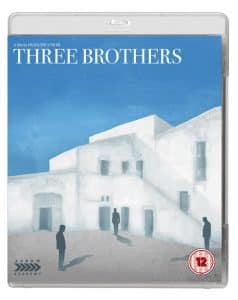

Dir: Francesco Rosi | Drama | Italy | 113′
Films centred round the death of a parent can be an effective, if dramatically obvious, springboard for an exploration of family feeling. Grief, regret and resentment could potentially explode. Nothing of any melodramatic flavour occurs in Francesco Rosi’s Three Brothers. Here the mother’s funeral takes place near the end of the film, acting as an epilogue to its principal story of the coming together of the brothers.
Raffaele (Philippe Noiret) is a judge, living in Rome, presiding over a terrorist case for which he risks assassination. Nicola (Michele Placido) is a militant factory worker in Turin, whose marriage has failed. Rocco (Vittorio Mezzogiorno) works as a teacher in a correctional institute for boys based in Naples. The North and the South. And three brothers of different generations – aged in their fifties, forties and thirties – leaving the city to return to their countryside birthplace in the region of Puglia.
Early on we quickly realise that Rosi is schematically setting up the story to portray a divided nation under the shadow of the political events at the beginning of the 1980s. That Three Brothers represents a microcosm of Italian society and one of several planes in which Rosi explores culture and character, proving to be a rich seam for a critical humanist enquiry. His threads are angry terrorist threats and actions, industrial action leading to violence, religion presenting a false utopia and marital breakdown and stress. The chaotic tension for the brothers being aligned too, yet not placated, by the old father’s reflections (a magisterial performance from Charles Vanel) and Nicola’s young daughter’s innocence. All the characters live in their separate worlds. Yet Rosi wants them to connect not only through love but with a greater awareness of the problems and contradictions of a disturbed society.
Rosi fully admits to his didactic tone as follows:“Most people in Italy live in despondency and confusion, and in dealing with current situations one must do so with clarity, and risk seeming schoolmasterish.” This approach works well in the café sequence where Raffaele is questioned by the local villagers, watching the TV news about a terrorist incident, over what should be done. The spontaneous and concerned debate is brilliantly executed. It doesn’t work so well in Rocco’s dream sequence where he leads his boys to burn the objects of their poverty and create a false utopia (Deliberatively naïve though the scene may be it’s still artistically mismanaged.)
Rossi’s previous films Salvatore Giuliano (1963) or The Mattei Affair (1973) are overtly more political and angry works. Three Brothers is measured and lyrical. There are fantasy expressions of violence (A chilling assassination of the magistrate on a bus) but it is Rosi’s attempt to reconcile differences, examine conscience and mediate on death that gives Three Brothers its power. Critic Pauline Kael described it as“A wonderful film that moves on waves of feeling”. For once I agree with Kael. The quiet emotional resonance is realised by superb performances all round, the luminous photography of Pasqualino de Santis and the integrity of Rosi’s direction.
If not quite a masterpiece (Rocco remains an unexplored character – his answers to problems is flawed by an under-written script and the director’s occasional lurch into clumsy symbolism) the film contains so many unforgettably poetic moments. The framing of the three brothers, grieving for their mother, just before dawn in the house and courtyard, is a scene played out by as if they were a trio performing elegiac chamber music This almost forgotten film was nominated for an Academy Award. And has never before been available in a video format in the UK. It’s one of Rosi’s finest films. Alan Price©2017 ****
NOW AVAILABLE COURTESY OF ARROW FILMS & VIDEO